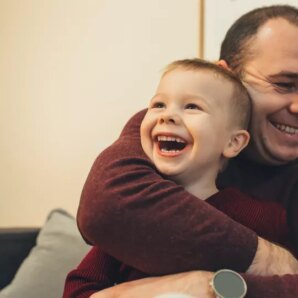Father’s Day is a fantastic time of year to celebrate our loved ones and say thank you to them for all that they do. However, some children in care may find that they deal with complicated feelings and negative emotions around the time of this special holiday. Let’s explore some ways in which you can help your foster child to understand and manage their emotions so that they can enjoy a peaceful, happy Father’s Day.

Get to know your foster child’s feelings about Father’s Day
With many different – and potentially difficult – scenarios relating to a child’s relationship with their birth father, Father’s Day can be a confusing and difficult time of year for children in care. It’s important to take the time to get to know your child’s personal feelings around Father’s Day rather than assuming how they feel based on what you know about their relationship with their birth father.
Sensitivity is key when discussing Father’s Day with your foster child. You can encourage them to share their feelings about the holiday by asking them gentle, open-ended questions like:
- Why do you think some people choose to celebrate Father’s Day?
- What do you think Father’s Day is about?
- Do you think Father’s Day is an important holiday?
- Is there anyone you would like to celebrate together on Father’s Day?
Navigating complex feelings
Father’s Day celebrations can bring up complicated feelings for children. It’s important to be aware that your foster child may be having conflicting emotions around Father’s Day, which can be difficult for them to understand and can leave them feeling guilty or confused. They might be having thoughts such as:
“I love my dad, but I’m too angry and upset with him right now to want to celebrate him on Father’s Day or send him a card.”
“I miss my dad so much since he passed away, but I think that doing something to celebrate his memory this year would be too upsetting for me.”
“I love my birth dad and my foster dad, and I feel like by celebrating with one, I’m being disloyal to the other.”
It’s important to take the time to help your foster child to understand that it’s okay to feel two conflicting feelings at once. By being an active listener, you encourage your foster child to open up to you when they are struggling or need reassurance.
Another thing to be mindful of is if you have your own children within the family and how this may impact a foster child. If your birth children are celebrating Father’s Day with their dad, this can highlight difficulties a foster child has with their own father or the fact their father is not present. Be sensitive to this, while maintaining a suitable balance between supporting all children in the household with their feelings and allowing them to celebrate how they choose.
Let children share at their own pace
The most effective way of managing feelings is by talking about them with a trusted person. However, some children may not want to talk about Father’s Day or their birth father, as the subject may be too difficult.
It’s important not to push them if you get the sense that they are not ready to talk. Instead, let them know that you are always there for them if they want to talk. This gives them an opportunity to open up to you in the future. You could also encourage them to share with someone else who cares about them dearly, such as their friends, a teacher, another family member, or even a pet.
Common emotions around Father’s Day
Dealing with anger
Feelings of anger may arise for some children around Father’s Day. A child might be angry with their birth father, or they may be angry at you and their social worker if they want to live with their dad or spend time with them on Father’s Day, but it has been decided that this isn’t in their best interests right now.
It’s important to let your foster child know that it’s okay to feel angry and frustrated, and that no emotions are wrong or bad. However, they need to learn the skills to manage their difficult feelings so that they do not hurt themselves or the people around them, either emotionally or physically.
It can be helpful to teach your foster child to recognise their body’s warning signs when they’re getting angry. This might be tensing their fists, pacing or feeling like they want to kick or hit things. Teach them calming techniques such as deep breathing exercises which they can use when they notice that their emotions are rising and encourage them to use healthy emotional outlets such as talking with loved ones or getting active to help release some of their feelings of frustration. Your supervising social worker will be able to advise you on supporting a child’s emotions, so always reach out if you are worried about a foster child’s anger. Check out more tips on how to help children to manage their anger.
Dealing with grief
If a child has lost their father, then Father’s Day can be an exceptionally painful time of year. You can support your foster child in managing their feelings by being open and approachable when it comes to talking about the death of their loved one, rather than treating their loss as a taboo subject. Reassure your foster child that it is normal for them to have feelings of grief, anger and sadness even if it has been a very long time since their father passed. Let them know that you understand how painful this is for them, and that you are there to take care of them and support them through their grief.
Allow your foster child to take the lead in how they would like to remember their father on this special day, and help them to honour him in whichever way feels right to them. This may involve visiting their father’s resting place, reminiscing through old photographs, or doing an activity which their dad loved in remembrance of him. You could also create a Barnardo’s Grief Self Care Kit with your foster child, which can help them to ground themselves on days when things feel particularly difficult.
Dealing with sadness
Some foster children may find that Father’s Day makes them feel sad and isolated. Being surrounded by friends and classmates who are celebrating with their dads can leave them feeling envious or left out.
If their birth father is absent, unreliable or has hurt them in the past, they may struggle with feeling unworthy and insecure. They may blame themselves and ask themselves questions such as, why doesn’t my dad love me? Did I do something wrong?
It’s important to reassure your foster child at this difficult time that they are loved by so many people. Spending time with friends and family during difficult times can help them to focus on the wonderful things they have in their life, and can remind them of how special and valued they are. Be ready to offer them extra support at this time, whether it’s a lovingly prepared hot chocolate and a chat or a comforting hug and some reassurance. Creative mindful activities such as journaling, drawing, or crafting a calming sensory jar together can also serve as great outlets for their feelings of sadness.
Enjoying Father’s Day together
There are many ways to make Father’s Day an enjoyable experience for children who have difficulties in navigating their feelings about their birth fathers. It’s important to let your foster child take the lead; they may want to treat the day like any other day, or may be eager to get involved in celebrating the day with their foster family and use it as an opportunity to show their foster dad how much they love and appreciate him.
By doing something enjoyable together as a family, such as having a day out together where everyone can get involved in an exciting activity, you can help to distract from negative feelings and ensure that your foster child feels a part of the celebrations. Be mindful of your foster child’s feelings throughout the day and recognise that it could be a difficult time for them, even if they’re getting to do something fun with their foster family. Give them space to feel their emotions and support them if they seem sulky or not their usual selves.
Whether you choose to go all out in celebrating Father’s Day together or decide to keep things low key, we hope that these tips help you and your foster family to have a peaceful, enjoyable day together.

Supporting our foster parents
Father’s Day can also bring up difficult emotions for our foster parents, through being aware of the past experiences a child has had, and finding it hard to see your young person upset. Here at Fosterplus we’re always ready and able to help with whatever you may be dealing with so you never have to face difficulties alone.
If you can provide a loving, supportive and stable home for a child, you might be the perfect fit to become a foster parent. If you’re interested in a career which changes the lives of young people, get in touch with us here at Fosterplus today to learn more about the fostering process.
And a very happy Father’s Day from all of us here at Fosterplus!





